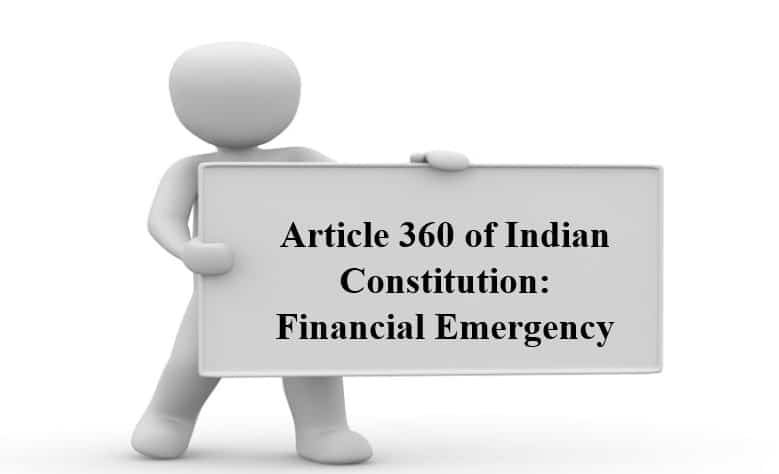The Constitution of India not only provides for Emergency in cases of threat of security to India at the National and State level but also recognizes the economic threat that may arise in certain situations. Therefore, in case of occurrence of such an occasion, Article 360 of the Indian constitution provides for the provision for imposing Financial Emergency in the Country.
Article 360 of the Indian Constitution
Article 360 of the Indian Constitution provides that a Proclamation of Financial Emergency may be issued if the President believes that such a situation exists where the financial stability of India or any part of the territory is threatened.
Financial Emergency can be proclaimed on the ground that when a situation arises in the country which leads to a financial crisis, the President of India may impose an emergency to tackle the situation. In such a situation, the Central Authority may reduce the budget or cut the budget given to the State, and salaries of the government officials may be deducted.
However, it is important to keep in mind that the 44th Constitutional Amendment Act, 1978 states that the President’s ‘satisfaction’ is not beyond judicial review. In other words, the Supreme Court can review the declaration of a Financial Emergency.
Parliamentary Approval under Article 360

Under Article 360 of the Indian Constitution, before the President of India imposes an emergency, it shall be approved by both Houses of Parliament. If not, after the expiry of two months, from the date of issuance of the proclamation, it ceases to operate.
If the Lok Sabha dissolves within two months, then, in that case, the Lower House is required to approve the proclamation within thirty days, starting from the first day of sitting after its reconstitution. Rajya Sabha must approve it in the meantime.
A proclamation of financial emergency must be approved by both the Houses of Parliament within two months starting from the date of its issue.
Things to be applied under Article 360
Once approved by both the Houses of Parliament, the emergency continues to operate until it is revoked. This implies two things:
- Repeated Parliamentary approval is not needed for its continuation.
- No maximum time limit is prescribed for the operation of a financial emergency.
A resolution approving the proclamation of financial emergency can be passed by either of the Houses of Parliament (Lok Sabha or Rajya Sabha) by a simple majority.
A proclamation of Financial Emergency can be revoked by the President at any point in time without any Parliamentary approval.
Effects of Financial Emergency (Article 360)
After the emergency is approved by the parliament, the Union takes absolute control over the financial affairs of the country. It can issue a direction to the state governments regarding their conduct on financial matters.
During the period of such an emergency, Parliament has the power to reduce the salaries and allowances of the people working under the Union or the State Government. Financial and Money Bills passed by the State Legislature of the State are then sent to the President for his consideration. The President acts on the advice of the Council of Ministers.
In short, the Union will approve what kinds of bills a state is allowed to pass. Further, the government also has the power to reduce the salaries of all government employees throughout the country. Thus, even if the employees work for some State Governments, they too will not be spared. It also gives the government the power to reduce the salaries of the armed forces, and the judges of the Supreme Court and High Courts.
However, there will be no effect on the fundamental rights of the citizens of the country.
Criticism of the Emergency Provision
One major flaw in the law regarding financial emergencies is that, unlike other laws, it has no specification. ‘Financial Instability’ is a loose word, and governments can twist this at their own will. India has a federal structure with the authority of power within the centre.
However, this law hinders the autonomy of the elected governments of the state. Their powers to decide on the best interests are restricted. Furthermore, the Central Government manages the economy of India. Even the well-performing states will be bound to face the impact of the mismanagement and failure of the Union.
Few members of the Constituent Assembly criticized the inclusion of emergency provisions in the Constitution on the following grounds:
- The union becomes all-powerful which destroys the federal character of the constitution.
- The powers of both, the Union and the States will entirely vest in the hands of the union executive.
- The president will become a dictator.
- The financial autonomy of the state will be quashed.
- The fundamental rights will become pointless and, as a result, the democratic foundation of the constitution will be destroyed.
Read our article on Emergency in India| Types of Emergency in India
Conclusion
The clause of Financial Emergency was inspired by the ‘National Recovery Act, of 1933’ in the USA. It created provisions to tackle the menace of the Great Depression of 1930. However, in India, the law has never been brought to use. Despite facing a demeaning financial crisis in 1991, and battling hunger and war together in 1965, India never invoked the provisions of financial emergency even partially.
The act of declaring a financial emergency brings a bad name as well as tarnishes the image of the country. India is the world’s fifth-largest economy, and any such action would affect the country, its credibility, and its trading partners in the worst possible manner. An emergency is a bad sign because it curbs basic freedom, be it fundamental rights or the right to buy, sell, and spend. Such actions are never beneficial for the reputation and betterment of a nation. Yet, desperate times call for desperate measures.

